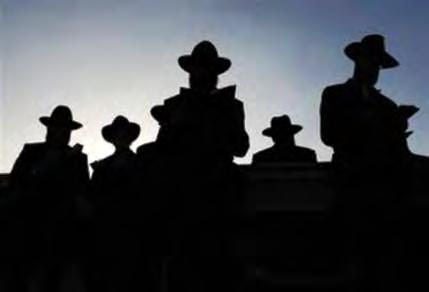
4 minute read
Delving into the Daf by Rabbi Avrohom Sebrow
Delving into the Daf
Minutes Till Minchah
By Rabbi Avrohom Sebrow
The very first paragraph in Shulchan Aruch expounding the laws of Minchah raises the following question: “What if there is barely any time left for Minchah?” How appropriate! Very often, people are busy and leave Minchah prayers for the last possible moment. The Shulchan Aruch says that if time is too short to complete the chazzan’s recitation of Shemoneh Esrei within the appropriate time, the recitation of the first three brachos will suffice.
When is the appropriate time by which the chazzan should complete his recitation? Rebbe Shlomo Zalman, zt”l, says that it is shekiah, sundown. Chassidim would certainly disagree with this ruling. I remember the time I drove up to the mountains, and it was pitch black outside. I located a Satmar bungalow colony and entered the shul to catch Ma’ariv. To my dismay, they were already up to the silent Shemoneh Esrei. I figured I would daven Shemoneh Esrei with them and say birchos Shema and keriyas Shema afterwards. I was totally flabbergasted when the chazzan began reciting chazaras ha’shatz. It then dawned on me that they were in the middle of Minchah!
The Maharit says that one should certainly not leave Minchah for the last possible moment. Perhaps an urgent situation will arise and one will miss the opportunity to daven Minchah. As the Gemara writes in Berachos, in Eretz Yisrael, they curse one who waits until sunset to daven Minchah. Further, he cites our Gemara in Pesachim (65a) that illustrates that, as a general rule, one should never be one of the procrastinators.
Everyone in Klal Yisrael has a mitzvah to eat from the Korban Pesach on Pesach night. Consequently, there were many korbanos that needed to be slaughtered and offered on erev Pesach. The sheer number of Jews made it difficult for everyone to offer their korban Pesach at the same time. So, there were three shifts of Jews offering their Korban Pesach. The Gemara cites biblical support for these three shifts.
The last shift was called the lazy shift. The name implies that the last shift comprised lazy people. The Gemara is incredulous and asks: Who says that those individuals are lazy – perhaps they just ended up in the last shift? After all, some people have to be last! Moreover, even if there were only a few Pesachim to be brought that day, they still were separated into three shifts. To which the Gemara replies, “Yes, someone has to be last but it doesn’t have to be you!” Individuals should strive to make sure that they are not in the last shift.
So, too, when it comes to Minchah, one can fulfill his obligation of davening Minchah lechatchila as long as he finishes by sunset, but why wait until the last moment? An individual should always strive to perform mitzvos while there is still plenty of time left.
When is the preferred time to daven Minchah?
According to the Shulchan Aruch (233:1), one should not daven Minchah before nine and a half halachic hours have passed in the day. This time is referred to in halachic literature as Minchah ketanah. (These hours are calculated by dividing the daylight time into 12. In New York, these hours can be as long as 70 minutes in the summer, and as short as 50 minutes in the winter.) The Gemara told us earlier that on an average day the Korban Tamid was brought nine and a half hours into the day. Since the Minchah service corresponds to the afternoon Tamid, it is appropriate to daven at the time the afternoon Tamid would have been brought if the Beis HaMikdash were standing. Since the Tamid was not brought before nine and a half hours into the day, one should not daven Minchah before this time. Rebbe Akiva Eiger comments that initially one should daven Minchah exactly at this time, to reflect the symbolism.
Still, the Shulchan Aruch writes that if one did daven Minchah after a half hour past midday, he has fulfilled his obligation. Further, the Mishnah Berurah quotes the Rosh and Tur who totally disagree and say that one can even lechatchila daven Minchah after a half hour past midday. The Mishnah Berurah writes that one may certainly rely on the lenient opinions if one would like to start a large meal or embark on a trip. These activities should be started after one has already davened Minchah.
The Maharit writes that initially one should strive to finish Minchah by ten and three-fourths hours into the day. This accords with the opinion of Rebbe Yehuda, who holds that after this time one may already daven Ma’ariv.
Still, the Pischei Teshuva writes that the Arizal was meticulous to daven close to sunset based on a Gemara in Berachos that seems to indicate this.
At any rate, the moral of this article is that generally one should not put off mitzvos until the last possible moment. One should strive to be prompt and not push things off. There is so much more to write about this subject, but I’ll save it for later, as this article is already being submitted at the last moment.
Rabbi Avrohom Sebrow is a rebbe at Yeshiva Ateres Shimon in Far Rockaway. In addition, Rabbi Sebrow leads a daf yomi chaburah at Eitz Chayim of Dogwood Park in West Hempstead, NY. He can be contacted at ASebrow@gmail.com.










